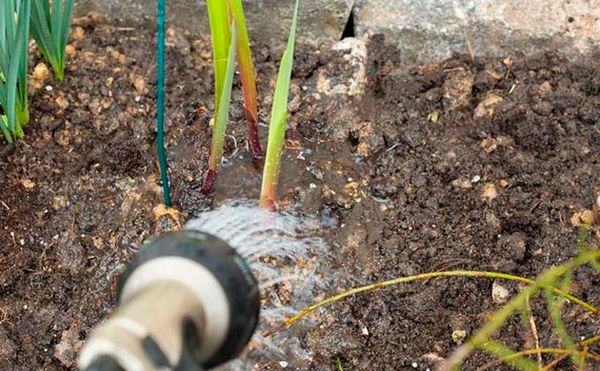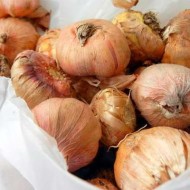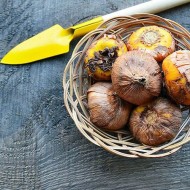Algorithm for preparing gladiolus bulbs for storage in winter
Content
Autumn care
In autumn, complex flower care consists of proper watering, fertilization and pruning. Compliance with the rules will allow the gardener to obtain bulbs suitable for wintering.
Abundant watering is necessary for gladiolus at a time when the green mass is actively growing and buds are forming. If there is little moisture, this is fraught with weakness of the roots and curvature of the aerial part of the flower. Watering should be carried out with warm water at the rate of 10-15 liters for each plant, after the procedure, weeding and loosening of the earth follows. For better tuber formation in the autumn period, watering is recommended to be reduced.
It is difficult to overestimate the role of dressings, of which there should be several. At the time the second leaf appears in the culture, urea, potassium or ammonium nitrate and about 15 g of potassium sulfate should be added per 0.5 buckets of water. When the fourth leaf appears on the flower, a similar feeding is carried out again. You also need to use microfertilizers: preparations containing boron are useful for the formation of a bulb. The third time fertilizers are used after the appearance of 5-6 full-fledged leaves, for the fourth, nitrophoska is suitable - 30 g per bucket of water. At the end of the autumn period, we recommend using a solution of potassium permanganate.
For trimming, you need to prepare a clean knife, the procedure is planned for the morning or late evening. As a result, the trim should be reliably hidden between the leaves of the plant. We recommend trimming the above-ground part with pruning shears after removing the bulbs from the soil. With short pruning, not only the risk of infection of the tubers with diseases is reduced, but also the drying time is reduced.
Here's a step-by-step process for digging up the bulbs.
Video "How to save gladiolus bulbs until spring"
This video will show you how to properly store gladiolus bulbs in winter.
Digging up the plants
The procedure should be carried out 1–1.5 months after the end of flowering, choosing a dry and sunny day. Depending on the region, the tubers are dug up in September - early October. The first month is better for flowers growing in the middle lane, the second - for the southern regions. The timing is also adjusted for temperature: if at night it constantly drops to zero, then in the daytime, if there are positive indicators, you can harvest the bulbs.
It is necessary to extract the plant from the ground along with green foliage. It can be yellowed in hybrid and early varieties of gladioli. First, they dig up early, then middle and late varieties of gladioli. A shovel is used, with which the plant is carefully undermined at a distance of 20 cm from the tubers.
After digging, the future planting material is laid out according to varieties, shaking off the ground. The stems on the tubers should be shortened with pruning shears to a height of about 20 cm and folded into wooden boxes, cardboard boxes or cloth bags. Bulb preparation includes drying and preparation.
Drying
Planting material can dry perfectly not in special containers, but in black boxes, which previously contained vegetables and fruits. The whole process takes up to 1.5 months. The boxes should be located in a room with a temperature of +24 ° C. Next, you need to remove the roots, children and stems from young bulbs, put them in paper bags according to varieties.
Treatment
Preparation of gladioli for storage in winter also consists in disinfection of tubers, laid out in gauze bags, with Inta-Vir, Hom and Maxim products. At the end of the procedure, the planting material is again dried at home at a temperature of +30 ° C for a week and at +20 ° C for a month. Then the tubers are placed in a place where they will be stored in winter.
Home storage
To minimize possible losses due to damage to corms, after preparing gladioli bulbs for the coming winter, we recommend choosing a place to save them in a city apartment, refrigerator or cellar. For wintering, it is necessary to select bulbs without signs of disease and external damage, under 4 years old, rounded and approximately the same in height and diameter, children should be large and with intact scales.
In the apartment
Bulbs need to be allocated a place with a temperature regime of +8 to +10 ° C. It can be a glazed loggia (if frost hits, planting material will have to be brought into the room), an entrance hall or a common corridor, a window sill. Tubers must be placed in a triple layer of old newspapers. They require periodic inspection to identify and discard diseased specimens.
In the cellar
An excellent place to place gladioli tubers will be a cellar, in which the temperature is always in the range of 3-7 ° C above zero, and the humidity level is at least 60%. It is best to place the planting material in mesh boxes and place them in tiers. In the cellar or basement, do not put any fruits or vegetables next to the bulbs, otherwise the moisture that appears can provoke rotting of the tubers.
In the fridge
The humidity and temperature levels of the refrigerator are also good for keeping the bulbs. You can put them in a special compartment for herbs or containers for vegetables. Each variety should first be wrapped in a couple of layers of newspaper. When choosing such a place, it is convenient to periodically check the condition of the tubers and remove moldy or diseased ones.
Major side effects
Containers for placing bulbs must be ventilated, so you cannot use plastic containers without holes or plastic bags. When using them, the number of rotten and spoiled tubers can be from 50 to 70% of the total volume. If there is no oxygen access to the tubers, the decay process will start. To prevent damage to the planting material, we advise you to put a pair of garlic cloves cut into pieces in boxes. You can also sprinkle wood ash on the bulbs.
If rotten specimens are found in the refrigerator or elsewhere, gray mold caused by excessive moisture is to blame. Drying tubers and replacing old newspapers in which they are wrapped with new ones will help.
Pest control
In winter, thrips can harm the planting material. If they are found, the damaged specimens are removed, the remaining ones should be treated with the "Hom" agent. If it is not possible to buy it, the bulbs are placed in a hermetically sealed container. Thrips on damaged tubers die if you put cotton wool with rubbing alcohol. Next, you should dry the material. The procedure is carried out with a break of 4 days.
Properly prepared bulbs of your favorite varieties are able to withstand the cold with dignity, in order to then again delight the gardener with beautiful and fragrant gladioli that have emerged from them.








